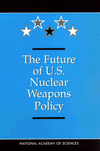
3月1日に発表予定の米国の「核態勢の見直し(NPR)」で、「核兵器の唯一の役割は他国による核攻撃の抑止である」とする政策が採用されるかどうかの鍵を握るのが日本政府の態度だと見られています。日本では、「唯一の役割」政策だと、北朝鮮の生物・化学兵器の使用を抑止できなくなるとの議論があります。この問題について、1997年に米国科学アカデミーの「国際安全保障・軍備管理委員会」が出した『米国の核兵器政策の将来』(原文pdf)が明確な結論を下しています。
この1997年の報告書は、他国が核兵器を取得しようとするインセンティブを減らすためにも「米国の核兵器の唯一の目的は米国及びその同盟国に対する核攻撃を抑止することだと発表して、核兵器の先制不使用を公式の宣言政策として採用すべきである」と提言しています。米国軍備管理軍縮局の局長を務めた経歴を持つウイリアム・バーンズが中心になって作成した同報告書は、さらに、「米国は、生物・化学兵器の脅威に対応するために核の抑止力を使うことを必要としていないし、それを望むべきでもない」と述べています。
佐藤行雄元国連大使は昨年のカーネギー平和財団の会議で
生物・化学兵器の使用を抑止する信頼性[信憑性]のある手段がないまま、核抑止の目的を、核兵器の使用の抑止にのみ限定するのは時期尚早であるということを強調しておきたい。・・
と述べました。佐藤氏(外務省外郭団体日本国際問題研究所元理事長)が日本側諮問委員を務めた「核不拡散・核軍縮に関する国際委員会(ICNND)」の報告書(外務省訳pdf)は、このような日本側の立場の影響のためか、
少なくとも、すべての核武装国は、保有する核兵器を維持する「唯一の目的」は、他国が、自国又はその同盟国に対して核兵器を使用することを抑止するためであるということを宣言する。
ことを提唱するなかで、次のような文言を付け加えています。
(同時に、当該同盟国には、特に生物・化学兵器を含め、その他の兵器による容認できない危険にさらされることはないという強固な保証を供与する。)
このような文脈で科学アカデミーの報告書を今読み直してみるのは意義があると考え、報告書の「化学・生物兵器の拡散に対する対応」(74ー75ページ)(英文)という項を下に訳出しました。
この報告書の作成に当たった委員会には、現在オバマ政権に入っているジョン・ホルドレン(大統領補佐官:科学技術担当=ホワイトハウス科学技術政策局(OSTP)ディレクター)、スティーブ・フェター(OSTPアシスタント・ディレクター)、ローズ・ガテマラー(国務次官補:検証・順守担当)らが名を連ねていました。これは、オバマ政権が大胆な核政策変更を行う可能性を持つことを示しています。問題は、現状維持派が日本政府のこれまでの立場を指摘し、日本の立場を無視すると日本が核武装するかもしれないと主張していることです。
合わせて、2009年カーネギー会議での佐藤氏の発言に対するカーネギー国際平和財団副所長のジョージ・パーコビッチ、スタンフォード大学政治学教授で国際安全保障・協力センター(CISAC) の共同ディレクターのスコット・セイガンの反論もご覧下さい。
参考
- 核不拡散・核軍縮に関する国際委員会(ICNND)
- 科学アカデミー(NAS)の1997年報告書
NASサイトの紹介記事 1997年英文
報告書についての『アームズ・コントロール・トゥデー』誌紹介記事 1997年5月英文 - 「先制不使用宣言と日本の核政策」 『軍縮問題資料』1998年11月号
- 米国議会技術評価局『大量破壊兵器の拡散:リスク評価』1993年 英文pdf
『米国の核兵器政策の将来』
「化学・生物兵器の拡散に対する対応」
現在の米国の核政策の中で議論なっている分野の一つが、米国、その軍隊、あるいは同盟国に対する他国による生物・化学兵器(CBW)の使用を抑止するため、あるいは、これに対応するために核兵器を使うべきか否かと言うものである。CBW攻撃に核兵器で対応するとの公式の政策を米国は明言すべきだと考えるものもある。米国が提供しているいかなる「消極的安全保証(NSA)」にも関わらずである。また、米国は明確な核の脅しはすべきではないが、潜在的敵国が最悪の状態を想定するのをそのままにさせておく、あるいは、それを奨励することさえすべきだと主張するものもある。これは、ペルシャ湾岸戦争で米国がとった政策である。例えば、ジェイムズ・ベーカー元国務長官は、後にその回想録で、当時、「イラクによる化学・生物剤の使用は核報復を招く恐れがあるとの印象を意図的に残した」と述べている。前述の通り、その後、アフリカ非核兵器地帯の議定書1の署名、それに、上院による化学兵器禁止条約に関連してなされた米国の発言は、この曖昧性を維持している。
しかし、[生物・化学兵器に対する]核報復についての曖昧性も、公然たる核報復政策も、米国の長期の目標・国益に沿ったものではない。当委員会が先に主張した通り、米国は、他国による核兵器の使用を抑止し、これに対応するためにのみ核兵器を使うと宣言すべきである。米国は、CBWの脅威に対応するために核の抑止力を使うことを必要としていないし、それを望むべきでもない。
CBWを核で抑止する政策は、核拡散のインセンティブを提供し、核拡散にとって簡単な正当化の理由を提供することになる。これは、米国の安全保障に反するものである。米国よりも、ずっともっともらしい──そして、緊急の──CBWの脅威に曝されている国々が幾つもある。もし、米国の政策が、CBWに対する最終的回答として核兵器を示すのであれば、他の国々にとって、核兵器取得の動機が増えることになる。核戦力の新たな、あるいは、継続する役割を強調することは、核不拡散に関する世界のコンセンサスを損なうことになり得る。
米国は、その安全保障にマイナスの影響をもたらさない形でCBWの問題に対処する他の手段を有している。最も基本的な対応は、生物・化学兵器禁止条約に見いだすべきである。これらの条約は、両種の兵器を禁止するもので、これらの兵器の使用に対するタブーを再強化し、これを極めて良く維持してきた。逆のことが喧伝されているが、CBWの拡散やその使用に対するこの障壁は、強固なままである。そして、化学兵器禁止条約の発効や、生物兵器禁止条約の強化に向けた現在の動きなどにより、この障壁は、今後さらに強化されて行くことは間違いない。国家や非国家主体がこれらの条約を無視し、CWBを使うと脅して来た場合は、脅された国は、CBWの影響から軍人や民間人を守るためにかなり効果的な措置を講じることができる(核兵器による脅しの場合と異なるところである)。国際的な圧力──国連の決議・制裁措置その他の手段──も、このような兵器を製造している、あるいは使用しそうだとされる国に対してかけることもできる。
米国の通常兵器は、CBWに対して、強力な抑止効果と戦争遂行対応を提供する。CBWの使用には通常兵器でするとの脅しの方が、核攻撃するとの脅しよりもずっと信憑性がある。これは、他の、もっと説得力ある理由のためである。まず第一に、核による報復という政策は、米国が非難している方法そのものを是認することになる──すなわち、大量破壊兵器の使用である。核報復は、ほとんど全面的な非難を招くことになるだろう。それにより、米国の敵を被害者として描き出すことになってしまう可能性がある──米国の対応をもたらした行為が何であったかに関わらずである。とりわけ、核報復の物理的影響が、攻撃目標の境界、そして、敵国の国境を越えた場合は、ほとんど間違いなくそうなるだろう。最後に、核兵器の不使用という基準を犯そうと米国の大統領が望むほどの極端な挑発を想像するのは難しい。核兵器の不使用という基準は、冷戦時代の極端な脅威や緊張状態でさえ生き延びてきたのである。実際、核による報復の最悪の結果は、軍事的に成功だったと見られることになる可能性である。そうなると、核兵器が有用だと見られる結果、それにより核兵器の維持、あるいは、さらに悪いことには、新たな取得が正当化されるとの考え方が再強化される可能性がある。
Responses Against Chemical and Biological Weapons Proliferation. One contentious area of current U.S. nuclear policy is whether nuclear weapons should be used to deter or respond to the use of chemical and biological weapons (CBW) by states against the United States, its military forces, or its allies. Some would have the United States enunciate an official policy of responding to CBW attacks with nuclear weapons, regardless of any negative security assurances to which it is committed. Others argue that the United States should make no explicit nuclear threat but allow or even encourage potential adversaries to assume the worst. This is the policy the United States followed in the Persian Gulf War. Former Secretary of State James Baker, for example, later wrote in his memoirs that at the time he "purposely left the impression that the use of chemical or biological agents by Iraq could invite tactical nuclear retaliation."14 As already noted, subsequent U.S. statements made in connection with its signing of Protocol I of the African Nuclear Weapons Free Zone treaty and with Senate consideration of the Chemical Weapons Convention have maintained that ambiguity.
Yet neither ambiguity nor an outright policy of nuclear retaliation serves long-term U.S. goals or interests. As the committee argued earlier, the United States should state that it will use nuclear weapons only to deter and respond to the use of nuclear weapons by others. The United States does not need and should not want to employ nuclear deterrence to answer CBW threats.
A policy of nuclear deterrence of CBW would provide incentives and an easy justification for nuclear proliferation, which is inimical to U.S. security. Many other countries face far more plausible and immediate CBW threats than the United States. If U.S. policy points to nuclear weapons as the ultimate answer to CBW, other states could have an increased motivation to acquire nuclear arsenals. Highlighting new or continuing missions for nuclear forces could damage the nuclear nonproliferation consensus throughout the world.
The United States has other means to deal with the CBW challenge that do not have negative consequences for U.S. security. The most fundamental response is to be found in the Chemical and Biological Weapons Conventions, which outlaw both classes of weapons and have reinforced a taboo against their use that has held up remarkably well. Despite rhetoric to the contrary, this barrier to CBW proliferation and use remains strong and, with entry into force of the Chemical Weapons Convention and current moves to strengthen the Biological Weapons Convention, promises to grow stronger over time. In cases where states or nonstate entities ignore these conventions and threaten the use of CBW, the threatened states can often take reasonably effective measures to protect military or civilian personnel from the effects of CBW (in contrast to the case of nuclear threats). International pressure―United Nations resolutions or sanctions and other means―also can be brought to bear on states claimed to be producing, or about to use, such weapons.
U.S. conventional forces offer a formidable deterrent and war-fighting response to CBW. The threat of conventional retaliation against CBW use is far more credible than the threat of nuclear attack for other, even more compelling reasons. First and foremost, a policy of nuclear retaliation endorses the very methods the United States condemns: the use of weapons of mass destruction. It would likely invoke nearly universal condemnation, in fact, thus casting a U.S. adversary in the role of victim, whatever the act that provoked the United States. This would almost certainly be the case if the physical consequences of a nuclear response carried beyond the boundaries of the immediate target area or the borders of the opponent. Finally, it is difficult to imagine a provocation so extreme that any U.S. president would want to breach the threshold of nonuse of nuclear weapons, which after all survived even the extreme threats and tensions of the Cold War. Indeed, the worst outcome of a nuclear response is the prospect that it might be seen as militarily successful, thus inspiring renewed belief that the perceived efficacy of nuclear weapons warrants their retention or, worse, acquisition.